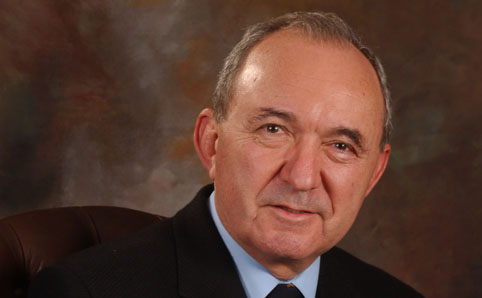Latest News Archive
Please select Category, Year, and then Month to display items
09 November 2018
|
Story Charlene Stanley
|
Photo Charlene Stanley
 Dr Tseliso Ntili, HOD of the Free State Department of Water and Sanitation, warns that pollution caused by mismanagement of municipal water-treatment works puts severe pressure on the province’s water security.
Dr Tseliso Ntili, HOD of the Free State Department of Water and Sanitation, warns that pollution caused by mismanagement of municipal water-treatment works puts severe pressure on the province’s water security.
“Despite our water challenges, Bloemfontein will never become a second Cape Town.” This firm assurance was given by Dr Tseliso Ntili, HOD of the Free State Department of Water and Sanitation, during his presentation at the recent regional seminar of the Faculty of Law’s Environmental Law Association.
The theme of the seminar was Water Quality and Water Security in Bloemfontein and was attended by staff and students from the Faculty of Law and the Faculty of Natural and Agricultural Sciences, as well as relevant role players from private, business, and government sectors.
Not enough water for city’s needs
Water restrictions in some form do seem to remain part of our future landscape though, as Dr Ntsili explained that the city’s current water yield of 218 megalitres per day still fell short of the demand of 259 megalitres per day.
Pollution and mismanagement at municipal level
He pointed out that a big cause for concern was that 75% of the Free State’s waste-water treatment works were dysfunctional. Housekeeping and security at these plants are often severely neglected. Yet, it is difficult for the Department of Water and Sanitation to act against offending municipalities.
“In intra-governmental disputes, the courts must be satisfied that organs of state have taken all reasonable steps to settle contentions – which can be a time-consuming process,” he explained.
Dr Ntsili said that the Caledon River System’s dwindling water levels due to low rainfall and siltation was also a concern, but that plans were underway to supplement the water supply to Bloemfontein via the Gariep Dam by 2026.
However, he warned that poor water management could drastically affect these long-term plans.
“If we can’t manage pollution, the cost will be high. Water security will be challenged, and we will have water shortages – not because of drought, but because of negligence.”
UFS awards honorary degree to Justice Richard Goldstone
2012-01-26
 |
| Justice Richard Goldstone |
A huge honour will be bestowed upon the University of the Free State (UFS) when the world renowned Justice Richard Goldstone will be receiving an honorary degree at the official opening of our university.
The Doctor of Laws (honoris causa) degree will be conferred on Justice Goldstone on Friday 3 February 2012 at 10:00 on our Bloemfontein Campus.
Mr Richard Freedman, Director of the South African Holocaust and Genocide Foundation, and Judge Mahube Molemela, Justice of the Free State High Court, are amongst the prominent figures expected to attend this event.
Justice Goldstone served in the Constitutional Court from 1995 to 2003. Prior to that, he was a judge of the High Court and from 1989 a judge of the Supreme Court of Appeal. From 1994 to 1996 he was the first Chief Prosecutor of the United Nations Criminal Tribunals for the former Yugoslavia and Rwanda. He is presently a Senior Fellow at the Jackson Institute at Yale University in the United States. Over the past 18 years he has become a leading expert on international criminal law.
Prof. Neels Swanepoel, Head of the Department of Law of Procedure and Law of Evidence, said the faculty is proud to honour Judge Richard Goldstone for his outstanding legal career and in particular for his contribution to the development of international criminal justice.
“As Chief Prosecutor for both the International Criminal Tribunal for the former Yugoslavia (ICTY) as well as the International Criminal Tribunal for Rwanda (ICTR), he has contributed to precedent-setting judgments on genocide, war crimes and crimes against humanity. His publications on various aspects of International Criminal Justice have contributed towards the stage where those bearing the greatest responsibility for human and humanitarian rights violations, will face justice.”
Prof. Swanepoel says judge Goldstone has contributed towards laying the foundations for conflict resolution in societies that have transformed from repressive to democratic rule and to what is now referred to as ‘transitional justice’.
On Thursday 2 February 2012 at 19:00, Judge Goldstone will deliver a Prestige Lecture on ‘The Future of International Criminal Justice’ in the Auditorium of the C.R Swart Building on the UFS Bloemfontein Campus.
Media Release
26 January 2012
Issued by: Lacea Loader
Director: Strategic Communication
Tel: 051 401 2584
Cell: 083 645 2454
E-mail: news@ufs.ac.za